Contents
Vol. 100
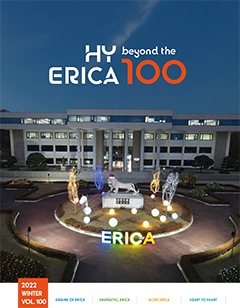
Cover Story ERICA 본관에 연말을 알리는 찬란한 빛이 내려 앉았습니다. 올 한 해 ERICA는 혁신과 성장, 끝없는 도전으로 달려왔습니다. 그 모든 성과는 온 힘을 다해 달려온 대학 구성원의 노력이 빚은 값진 결실입니다. 100권의 HY ERICA에는 수고를 아끼지 않는 대학 구성원의 모습, 그 노력의 과정이 고스란히 담겨있습니다. 더 나은 내일을 꿈꾸는 비전의 사람이 모인 이곳, ERICA의 이야기는 앞으로도 계속될 것입니다.
- ENGINE OF ERICA
- the 100th, HY ERICA ERICA의 모든 날, 모든 순간
- Now, ERICA 신안산선 한양대역 출입구 신설 · ERICA 미래 성장 기반 확보 원호식 캠퍼스혁신파크사업단장
- Focus on Research 환경 · 에너지 기술혁신 시대를 맞이하는 새로운 연구 플랫폼 구축 한양 환경 · 에너지연구원 개원
- ERICA Impact 학술적 성과, 그 이상의 결과에 도달하는 연구자의 도전 정신 컴퓨터네트워크 연구실
- ENERGETIC, ERICA
- LINC+&YOU LINC 3.0 축적된 인프라를 토대로 공유하며 확산한다 기업지원 프로그램
- Start Line 영상 콘텐츠 스타트업으로 살아가는 방법 크레용유니버스 윤보석 대표, 레이븐어스 정지용 대표
- ERICA Pride 그린수소 생산용 3차원 구조의 저비용 촉매 제시 이승현(화학분자공학과) 교수
- Take Classes 최첨단 K · 방위산업을 이끌기 위해 ERICA와 LIG넥스원이 손잡았다 지능정보융합공학과 신설
- ALIVE, ERICA
- Campus Finder 도전의 DNA, 모교를 향한 사랑, Opening Ceremony 노상일 HOLMZ 개관식
- ERICA People Ⅰ 미래에 실질적 변화를 일으킬 연구의 힘과 가능성 문효방(해양융합공학과) 교수
- ERICA People Ⅱ 남을 즐겁게 할 수 있다는 가치 있고 고귀한 일 영화감독 박규태(신문방송학과 91) 동문
- ERICA People Ⅲ 음악을 통해 대중과 교감하는 뮤지션으로 성장한다 정광수(실용음악학과 17), 조남준, 최아임(실용음악학과 18) 학생
- Special Lecture 기후위기, 인류가 지금 고민해야 할 유일한 화두 예상욱(해양융합공학과) 교수
ERICA Impact
The Challenging Spirit of Researchers
Aiming for More Than
Academic Achievements
Computer Network Lab
There are individuals at ERICA who continue to take on new challenges to make their research more complete. They are the people who continue to broaden their horizons to discover new possibilities, and with the lessons learned from conducting their research, they come closer every day to achieving their goals. Let’s meet Professor Suk-bok Lee and Ph.D. students Jae-min Lee, Hyun-woo Yu, and Ki-yeon Kim majoring in Computer Science, who have been working together as a team for eight years.
- Written by · Yeon-joo Lee
- Photo by · Cho-won Son
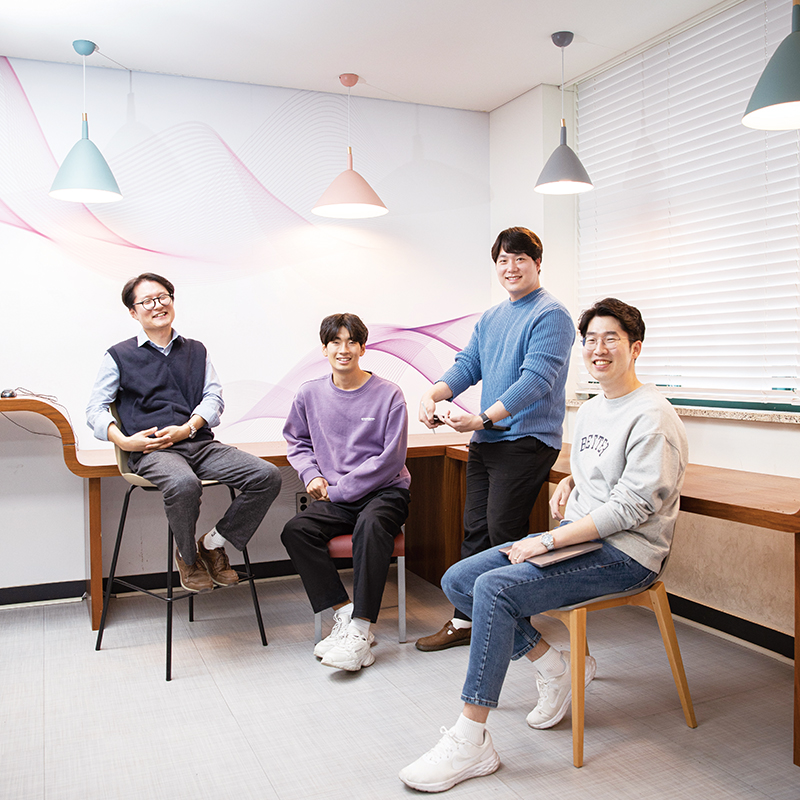
Young researchers at ERICA collaborated with world-renowned researchers
The Association for Computing Machinery Conference on Computer and Communications Security (ACM CCS) is a leading international forum on computer and communications security. Every year in November, more than 1,200 participants gather including information security researchers, practitioners, and developers from around the world to exchange information on academic achievements and discuss matters that will have significant impacts on the industry. Professor Suk-bok Lee and Ph.D. students Jae-min Lim, Hyun-woo Yu, and Ki-yeon Kim returned to Korea after giving a successful speech at the 2022 ACM CCS conference held in Los Angeles, California. This was their second time to give a speech at the conference after their first presentation in 2018. The research team presented their paper on audio privacy this time, following their speech on video privacy back in 2018 when they were the first research team from Hanyang University to attend the conference.
“Our research task started from establishing a system for sharing audio recordings. We felt that the way dash cam video recordings are reported, collected, and shared is as outdated as putting up banners, so we began research to resolve this issue.”
The research team took a deeper look particularly into the privacy of video recordings when researching the dash cam video sharing system. The sharing solution will have different focuses on privacy for dash cam video recordings and audio recordings. The team conducted research this time on audio recordings, utilizing their insights into post-processing procedures regarding prevention of data falsification, privacy protection, and personal information protection acquired from the previous research on video privacy.
“The paper we’ve submitted this time was about the realization of a device capable of accommodating conflicting requirements, such as protecting the privacy of conversation recordings without losing audio authenticity. The solution we’re presenting maintains audio authenticity even after privacy processing.”
When disclosing or sharing audio recordings, the original voice is processed or modulated for privacy protection and the original signature data becomes invalid in the process. In short, the limitation of existing devices is that it is almost impossible to prove the authenticity of an audio recording. Professor Suk-bok Lee and the three Ph.D. students garnered much attention from many researchers in the academic world by coming up with technology that satisfies conflicting requirements, based on the development of an audio recording/sharing solution that supports privacy processing without losing audio authenticity.
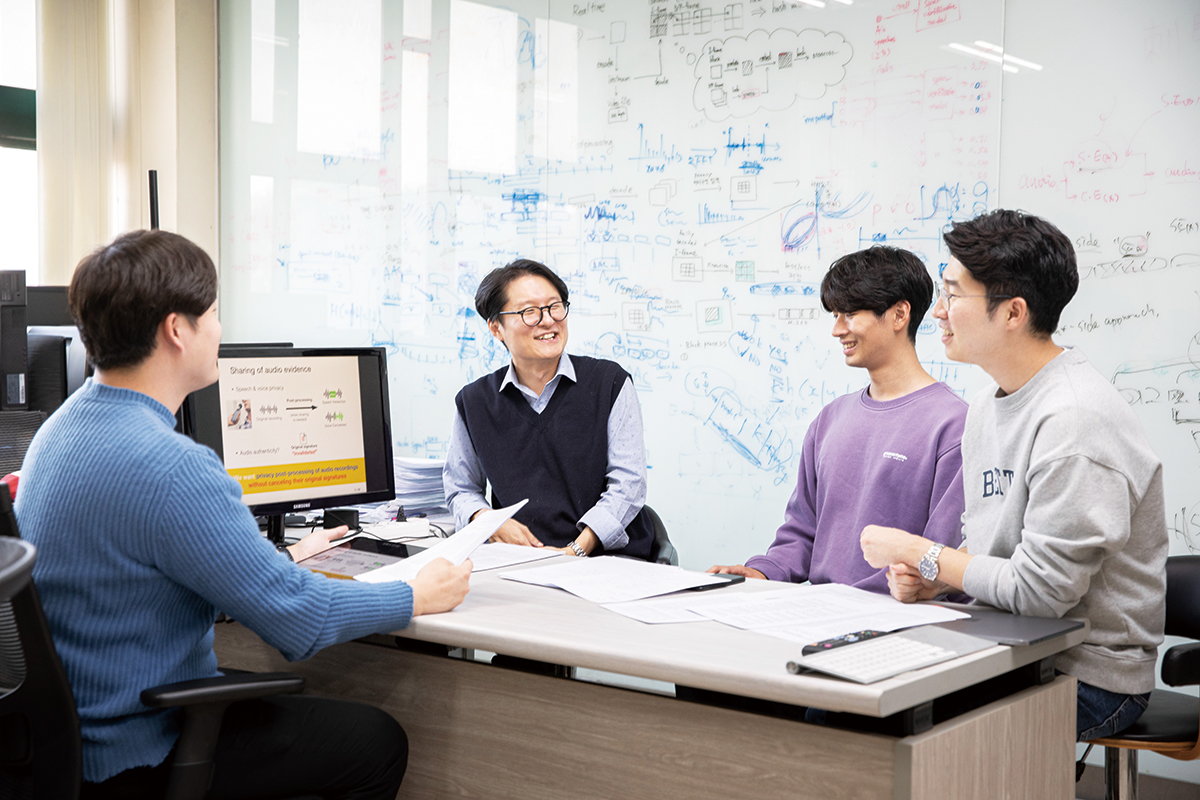
Hoping research brings changes for the better
As the world is paying greater attention to privacy protection and data-information processing, the technology that has been developed as a result of the research is expected to draw more interest and be in much demand. Whereas personal information collection and privacy exposures for reasons of service improvement continue to become issues across the entire industry and in our daily lives, users are left to deal with these issues on their own without having a proper understanding of security.
“Many people are using audio recording programs and although the technology has led to convenience and efficiency, not many people view this as a privacy leakage issue. This is because service providers collect and store all the information for recordings of meetings and phone calls, saying that the purpose is to enhance voice recognition performance. We view this as violation of privacy in a strict sense, so the focus of our research is to fundamentally change that structure.”
Professor Lee emphasized that the structural problem of the way private enterprises collect and store data should be improved. The ultimate goal of the researchers is to bring about changes in the service structure through reliable policies and technologies that focus on information protection. Overcoming the structural problems of private companies’ collection of personal information and providing reliable services mean more than just scoring points for technical achievements. Ki-yeon Kim, one of the Ph.D. students who took part in the research said that his life goal is to introduce technologies that will transform the world, instead of just conducting research that stays on paper, and that through this research, he would like to develop technologies that will be used by an increasing number of people. Privacy protection technologies are gaining recognition as core technologies, along with sophisticated AI and big data technologies. Another Ph.D. student, Hyun-woo Yu said he would like to conduct an in-depth study that expands on the research done so far, and that he will focus on developing products that can make people’s lives easier.
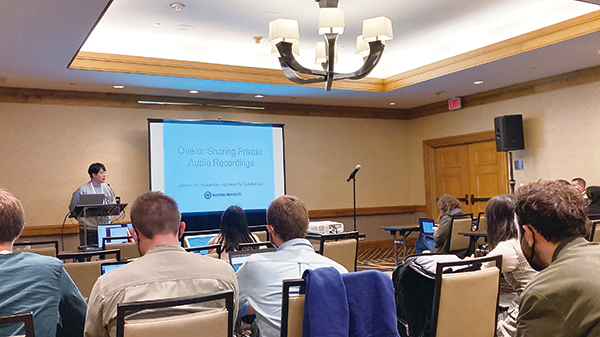 Ph.D. student Jae-min Lim’s speech and paper receiving much interest from researchers at ACM CCS
Ph.D. student Jae-min Lim’s speech and paper receiving much interest from researchers at ACM CCS
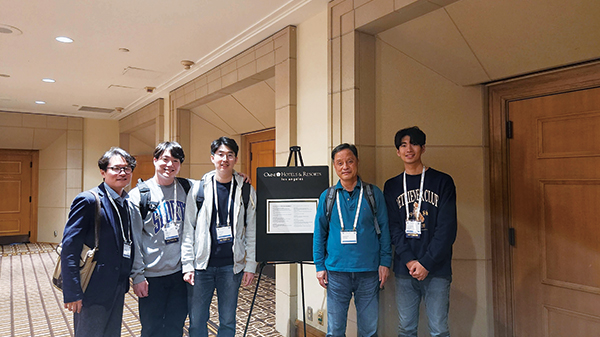 The researchers at the ACM CCS Conference (from the left) Professor Suk-bok Lee, Ph.D. students Jae-min Lim and Ki-yeon Kim, College of Computing Dean Hee-kuck Oh, and Ph.D. student Hyun-woo Yu
The researchers at the ACM CCS Conference (from the left) Professor Suk-bok Lee, Ph.D. students Jae-min Lim and Ki-yeon Kim, College of Computing Dean Hee-kuck Oh, and Ph.D. student Hyun-woo Yu
We want to create technologies that will transform the world,
not researches that are worth no more than the paper it is written on.
Results more valuable because they were hard-earned
“When we’re studying something that we’re unfamiliar with, we tend to get a clearer picture by referring to research conducted in that area, but no matter how deep I dove into this topic, I couldn’t get my head around it. The conclusion I’ve reached is that there is no shortcut to success so I started to research it from the very beginning.”
It was important to understand the mechanism of voice processing before researching audio privacy. According to Ph.D. student Kim, the team considered finding a way to understand the matter more efficiently at first, but then concluded that they had to start with the basics. The team has made slow yet steady progress over the course of more than three years from 2019 to 2022 when they presented their research paper to discover and expand possibilities.
“As I would often tell my students, a researcher’s best friend should be a sense of isolation. I did my best to give my team members emotional support knowing that they would feel stressed as it took a long time for us to achieve results.”
Professor Lee said that researchers often feel alone and isolated when doing research and added that such an environment is also an opportunity that gives enables them to develop creativity. When everyone felt stressed and exhausted, Ph.D. student Jae-min Lim said they continued to move forward without giving up and the three students eventually pulled together to achieve more meaningful results. Lim led the presentation and expressed his sincere gratitude to all of his team members who have supported each other throughout the entire period saying, “The eight years we’ve spent together have been priceless and moments I will always cherish.”
The research and academic achievements are the result of a combination of a large amount of data, ideas, and a strong commitment and dedication of the researchers. There is a firm sense of comradery among the research team who all stood by each other through hardships and difficult times. The fact that the team was there for each other is what made their achievements far more valuable and meaningful. The presentation and speech are over but the time the research team spent together will continue to be a driving force that will motivate them through their future projects together.
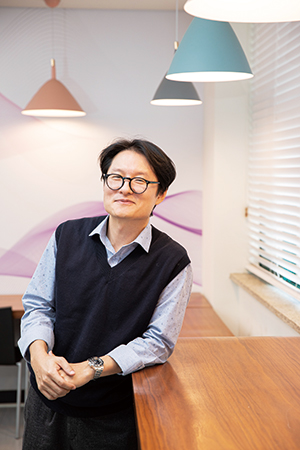
Suk-bok Lee
Professor
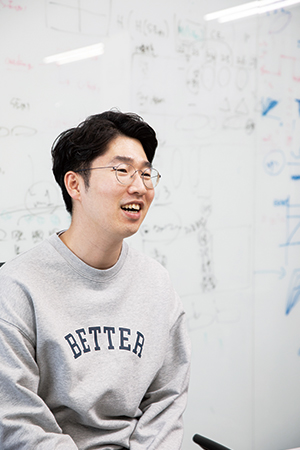
Ki-yeon Kim
Ph.D. students
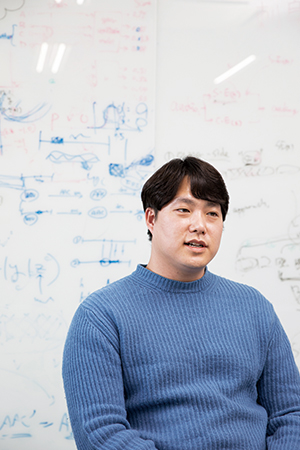
Jae-min Lim
Ph.D. students
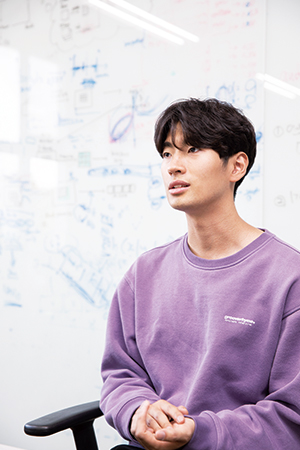
Hyun-woo Yu
Ph.D. students






